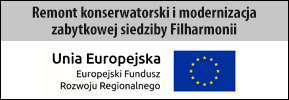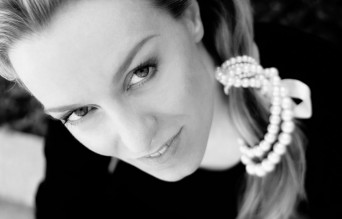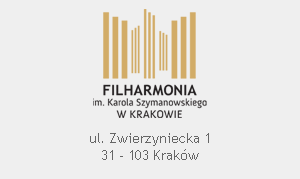



phone no.
506 625 430
open:
30-31.12 - 2pm-7pm

phone / fax no.
+48 504 856 500, + 48 504 063 337, + 48 12 619 87 22
e-mail:
6th MUSICAL AUTUMN IN KRAKOW

enlarge
performer(s):
Joanna Freszel – soprano
Bartłomiej Kominek – piano
programme:
Chopin, Moniuszko, Rachmaninow, Ptaszyńska, Szymanowski, Ginastera, Bacewicz, Zamuszko
Tonight’s concert focuses entirely on songs. To start with, Frederic Chopin’s three graceful compositions will keep our spirits high. They were written to be included in young ladies’ friendship books. Following the text of the Latvian Song, the composer made use of an “over-composed” form of the song to convey the tone of a conversation between mother and daughter with the help of musical gestures. On the other hand, Handsome Lad, and the popular Wish (often included in Polish songbooks) are stanzaic songs, reverberating with the distinct rhythms of Polish folk dances.
Stanisław Moniuszko’s compositions were an obvious choice, when putting together today’s programme. One of the leading representatives of Polish national music, he composed over 200 songs collected in the Songbook for Home Use anthology. The catchy melodies were supposed to serve the purpose of joint music-making in different situations of daily life. Amongst the songs selected for tonight’s concert, we will hear the Four Seasons, To a Nightingale, and Moniuszko’s most popular song The Spinstress.
The next item on the programme leads us into the world of Sergei Rachmaninoff’s vocal music. His broad and poignantly beautiful long-breath phrases carry an exceptional emotional load. Rachmaninoff, who was also a pianist, entrusted the piano with a very important role to play in his songs. We will listen to three of his compositions: Nie poj Krasavica from the collection of six songs, Op. 4, Dream from the Op. 8 collection, and Zdies haraszo, the seventh out of twelve songs in Op. 21.
A highlight of today’s concert will be the world premiere performance of a cycle of songs entitled Conversations with an Angel. The cycle was composed to celebrate the 200th anniversary of Stanisław Moniuszko’s birth, which is why it contains numerous thematic references to Moniuszko’s works of music. Amongst other compositions, we will listen to the Aria with Chiming Clock to the text of poet Jan Lechoń, directly referring to Moniuszko’s famous aria from The Haunted Manor. Conversations with an Angel also refer to Moniuszko’s songs in terms of their more general idea and purpose, which the author of the collection describes in the following way: “The purpose of the collection is not only to expand the available song repertoire for outstanding singers, but also to enrich a “songbook” that is going to be available for a larger group of young performers and everyone else who is keen on singing. I would like the collection to become a “songbook for home use” for all those who love music.” Next to Jan Lechoń, among the authors of texts selected by the composer, we will find Bolesław Leśmian, Joanna Kulmowa and Kazimiera Iłłakowiczówna.
Karol Szymanowski’s Children’s Rhymes will take us to the world of children’s imagination and games. The twenty pieces composed to the words of Kazimiera Iłłakowiczówna were written in the years 1922–1923. They were dedicated to Szymanowski’s niece Alusia Bartosiewiczówna, tragically deceased in 1925. Most of the songs are relatively simple, short and concise musical works.
Alberto Ginastera’s work Cinco canciones populares argentinas or Five Argentine Folk Songs was composed in 1943, and as such is one of the artist’s early pieces. We will listen to four out of the five compositions in the series: the quick and vigorous dance Chacarera, followed by the melancholy song Triste, reflecting on the theme of unrequited love, and by a matching dance Zamba, finished off by the traditional lullaby Arrorró. The author refers to his native Argentine folk music in the songs, while at the same time presenting those traditional melodies in a new 20th-century light, with extensive harmonics and a significant role of tone colours.
Grażyna Bacewicz is usually counted among the representatives of Neoclassicism, but the artist herself was strongly against such clear-cut classification. We will listen to three selected pieces out of her several songs for voice and piano. Loneliness is one of the three songs composed in 1938 to the words of 10th-century Arabic poetry, translated by Leopold Staff. It centres around the topics of love, longing and loneliness. I Have a Headache (to the composer’s own words) and The Little Magpie (to a folk text), on the other hand, are Bacewicz’s final songs that date back to 1955 and 1956, respectively, and stand out with their original playful style.
The colourful song kaleidoscope will end on a humorous zoological note. Sławomir Zamuszko’s songs from the Nasha Shkhapa cycle were composed to the texts of Ogden Nash and Hilaire Belloc. The poems come from the collection The Purple Cow, which contains some of the most famous nursery rhymes in English, later selected and translated into Polish by Stanisław Barańczak. The song cycle consists of six compositions, five of which (Cat, Poultry, Cow, Pig and Viper) will be performed tonight. The piano part clearly shows the author’s predilection to employ quotations from the already existing melodies. The vocal part, on the other hand, is highly demanding for the performer, as it includes numerous large interval leaps, and is abundant in unusual sound effects.
Aleksandra Biśta
transl. Katarzyna Franek-Sokołowska
JOANNA FRESZEL – a graduate of the Vocal Studies and Song Department at The Fryderyk Chopin University of Music in Warsaw, in Jadwiga Rappé’s class. A recipient of the Polish Ministry of Education scholarship twice, pro Polonia program and ISA 2012 program. She was awarded with Młoda Polska scholarship and the Magna cum Laude medal for the best graduate of UMFC (2013). A PhD student at The Fryderyk Chopin University of Music. Nominated for 2017 Koryfeusz prize and gained “Polityka” Passport (2017).
The artist has won many prizes and distinctions in many national and foreign competitions. She won, inter alia, the second prize in H. Halska Contest in Wrocław, the third prize and a special award in K. Szymanowski Contest in Łódź, the first prize and three special awards in J. E. J. Reszke Contest in Częstochowa, a special award in the International H. Gabor Belvedere Competition in Vienna and the first prize together with a special award in J:opera Voice Competition ISA’12 in Frankfurt. She was also a finalist of the Viotti Competition in Vercelli.
She took part in, inter alia, International Contemporary Music Festival Warsaw Autumn Festival (2010, 2015, 2016, 2017), Contrechamps Festival in Geneva, Saaremaa Opera Days in Estonia, Melos-Étos in Bratislava and in 7 Trends and 7 Premieres Festival, organised on the occasion of the 70th jubilee of the Union of Polish Composers. In 2011, she performed a recital in the UNESCO headquarters in Paris. In that year, she debuted as Musetta in La Bohème by G. Puccini (Poland), in the role of Vénus and Phrygienne in Dardanus by J.-Ph. Rameau (Ireland, the UK), and in the role of Fiordiligi in Così fan tutte by W.A. Mozart (Poland, Italy). She sang the role of Margatete in Faust of Ch. Gounod in the Estonian National Opera House, the part of Machine in Threads of K. Wołek in the National Forum of Music in Wrocław, the role of Susanna in Figaro Gets a Divorce by E. Langer and D. Pountney in S. Moniuszko Opera House in Poznań, the role of Psyche in Eros and Psyche of L. Różycki in Warsaw National Opera House. The artist successfully uses compositions from all the epoches. She specialises in performing contemporary music (inter alia “Credentials” or “Think, Think Lucky” by R. Haubenstock-Ramati, Shakespeare’s Sonnets by P. Mykietyn, Les Noces by I. Strawiński). She has performed a dozen of premieres, namely Stabat Mater by A. Pärt, Sadness Untitled by M. Nikodijević, Primordia Rerum by O. Bianchi, In Memoriam by U. Caine, Canticum Puerorum by E. Knapik. The artist performed with many orchestras in Poland and abroad: NOSPR, Sinfonia Iuventus, Beethoven Academy Orchestra, the Symphony Orchestra of Podlasie Opera and Philharmonic, Krakow Symphony Orchestra, the Silesian Philharmonic Symphony Orchestra, the Świętokrzyska, the Szczecin Philharmonic, the Pomorska Philharmonic Orchestra – Capella Bydgostiensis, New Music Orchestra, AUKSO – the Chamber Orchestra of Tychy, Orkestr de ereprijs (the Netherlands), Österreichisches Ensemble für Neue Musik, the Symphonic Orchestra Camerata Viva, performing, inter alia, under the baton of such conductors as Jerzy Maksymiuk, Gabriel Chmura, Jacek Kaspszyk, Krzesimir Dębski, Jerzy Salwarowski, Marek Moś, Paul Esswood, Wim Boerman, Szymon Bywalec, Tadeusz Strugała, Jacek Rogala, Adam Klocek, Arturo Tamayo, Michał Dworzyński. On the tour in Ukraine, she performed Chantefleurs et chantefables by Witold Lutosławski together with the Philharmonic Orchestras in Lemburg, Odessa, Czernichów, Donetsk and Dnipropetrovsk. In 2015, thanks to DUX Recording Producers, her debut album real life song was released, with pieces composed especially for her by M Bebinow, A. Kościow, R. Janiak, A. Zubel, S. Zamuszka, A. Borzym jr, J. Szmytka, K. Szwed. The album was nominated for the Fryderyk 2016 award in two categories and the award Orphée d’Or given by Académie du Disque Lyrique for the best interpretation of contemporary music.
BARTŁOMIEJ KOMINEK – studied with Janusz Olejniczak and graduated with distinction from the Academy of Music in Krakow. He participated in many master classes taught by the most outstanding piano tutors, such as Andrzej Jasiński, Oxana Jablonska, Lee Kum-Sing and Ryszard Bakst. He is currently a lecturer at the Academy of Music in Krakow, where he competed his habilitation in 2015.
The artist won several awards and distinctions in piano competitions and festivals both in Poland and abroad – at the Festival of Polish Pianists in Słupsk and the Festival of Talents in Tarnów, as well as at the events held in Kil (Sweden), Glasgow and London. The concerts he gave in Poland (Festival of Polish Music in Krakow, Polish Radio Music Festival in Warsaw, Bravo Maestro Festival in I.J. Paderewski’s manor house in Kąśna Dolna, Festival of Talents in Tarnów, International Festival of Contemporary Music Warsaw Autumn, Warsaw Music Encounters, Music on the Heights Festival in Zakopane, International Days of Krakow Composers), in many places in Europe, Middle East and Japan, received excellent reviews. He performed in Chopin Festivals in Ghent (Belgium), Valdemossa (Mallorca) and Nohant-Vic (France). He made numerous recordings for the Polish Radio and Television. He portrayed Fryderyk Chopin in a film produced by the Japanese Television.
In 2005 his recording of Chopin’s Etude in E major op. 10 no. 3 was selected to be a part of the CD with interpretations of the most renowned Polish pianists and winners of Chopin competitions. Later that year, together with Janusz Olejniczak, Gdańsk University Choir and eminent soloists, he recorded the infrequently presented Petite messe solennelle by G. Rossini. The CD was produced by the Gdańsk University. In 2010 DUX released his album with G. Bacewicz’s compositions (among others Piano Quintet no. 1 arranged for piano and chamber orchestra) which received a nomination to the Fryderyk award. In 2013 he recorded a monographic album for Polskie Nagrania covering the works of Croatian composers and president – Ivo Josipović. The artist has been active as a chamber musician and has collaborated with many well-known artists, ensembles and orchestras, including Sinfonia Varsovia, Krakow Philharmonic Orchestra, Sinfonia Baltica, Capella Cracoviensis, Polish Radio Orchestra, DAFÔ String Quartet, Camerata String Quartet, Prima Vista String Quartet, Polish Radio Choir in Krakow, Elżbieta Towarnicka, Olga Pasiecznik, Anna Radziejewska, Iwona Sobotka, Joanna Freszel, Bogusława Dziel-Wawrowska, Janusz Olejniczak, Tomasz Strahl, Marcin Nałęcz-Niesiołowski, Wojciech Michniewski, Jonatan Mann, Daniel Smith, Magdalena Bojanowicz, Aleksander Gebert, Bartosz Koziak, Klaudiusz Baran, Anna Maria Staśkiewicz, Konstanty Andrzej Kulka and Janusz Wawrowski. Since 2011 he has performed with pianist Anna Boczar as Chopin Piano Duo. He wrote the arrangements of Chopin’s all orchestral works for piano and string quartet that were published by PWM (Polish Music Publishing House).
Printable version
© Filharmonia Krakowska 2010










